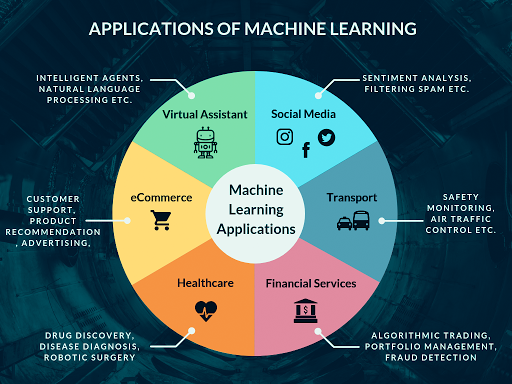Machine Learning has become the latest buzzword in the market today.With the advent of advanced ML techniques in the market space, businesses these days are able to increase their productivity and efficiency. Tech giants such as Google, Microsoft and Facebook have invested heavily in this technology.
The machine learning market is expected to grow from USD 1.03 Billion in 2016 to USD 8.81 Billion by 2022, at a Compound Annual Growth Rate (CAGR) of 44.1% during the forecast period.
By offloading work directly to the bots, employees are free to do tasks that involve deep thinking and strategic decision making. So clearly, leveraging ML techniques help in increasing work productivity thus allowing your employees to invest more time in doing other meaningful tasks.
Advantages of Machine Learning in eCommerce!
Have you noticed the recommendations you get for products on Amazon or the shows Netflix suggests you watch. All thanks to Machine Learning. ML algorithms analyze customer preferences based on their browsing/purchasing/viewing behaviors and then make intelligent recommendations.
Undoubtedly, ML is a game-changer for many industries. Machine Learning benefits have now plunged into the eCommerce industry too. Here in this blog, I have discussed some important advantages of Machine Learning in eCommerce. Let’s read these in detail.
Improved Personalization!
One of the major benefits of Machine Learning in eCommerce is its incredible potential to render an improved personalization to customers. By providing customers with what they desire helps you in staying connected with them.
91% of consumers are more likely to shop with brands who provide relevant offers and recommendations, says Accenture.
Machine Learning techniques analyze customer patterns and their shopping behavior. Based on this information, companies send personalized mails, messages and recommendations to their prospects letting them know about their latest sales and discounts.
Improving customer experiences and personalization is the principal reason why marketers are adopting AI and Machine Learning.

Optimized Pricing!
Online shoppers look for products with lesser price as compared to the prices that they need to pay while buying from a physical store. If a product costs as much as what it does in a brick and mortar store, then there is no use of purchasing it from your e-store. It is very common for e-shoppers to compare the prices of different products to find the best deal.
AI and Machine Learning have the potential to create an additional $2.6T in value by 2020 in Marketing and Sales, and up to $2T in manufacturing and supply chain planning.
Here comes the role of Machine Learning. By leveraging the incredible advantages of Machine Learning in eCommerce, online businesses have achieved much success by implementing dynamic pricing.
After analyzing other competitor prices prevailing in the marketplace and other various factors such as market conditions, demand, supply, customer type, Machine learning can change and readjust the prices. Thus, these Machine Learning uses in eCommerce help increase customer engagement and keep them hooked to your services.
Fraud Protection!
With the increase in the number of cyber attacks, eCommerce companies live under the impression that they are not secure enough. Online businesses are vulnerable to fraudulent activities. Thus, it is very important for the eCommerce owners to stay cautious of malicious attacks which can harm their online reputation as well.
63 percent of companies said their data was potentially compromised within the last twelve months due to a hardware- or silicon-level security breach.
One of the major advantages of Machine Learning in eCommerce is that it helps in detecting cyber attacks. ML techniques detect any anomalies and thus prevent cyber attacks. With these benefits of Machine Learning in eCommerce, companies are able to proactively detect cyber attacks and thus prevent loss to data security in advance.
Managing Demand and Supply!
Businesses have to deal with a large amount of data. Handling such a huge amount of data to make important strategic moves becomes difficult. This information needs to be well-reviewed so as to forecast demand and supply. A slight error could result in huge losses.
McKinsey found that 82% of enterprises adopting machine learning and AI have gained a financial return from their investments.
eCommerce businesses these days are looking for ways to analyze this data for making better decisions so as to manage demand and supply of their products. By leveraging incredible uses of Machine Learning in eCommerce, businesses now can process excessively large amounts of data. All thanks to the Machine Learning uses in e-commerce!
Omnichannel Marketing Boosted by Machine Learning!
The incredible benefits of omnichannel marketing just can’t be ignored. Omnichannel marketing helps to boost customer retention, customer engagement and boost sales. Boosting omnichannel marketing is one of the major advantages of Machine learning in eCommerce.
Omnichannel marketing is centered around customer data. ML techniques help to analyze customer data and update it automatically. This constant updating of data can make your marketing strategy more powerful and thus increase sales of your business.
Each time a customer buys or shops from your store, the information of this customer buying patterns will automatically get updated. These are one of the greatest benefits of Machine Learning in eCommerce which helps in making the appropriate strategy to allure your customers.
The Bottomline
By now, I am sure you have got a clear idea of the major uses of Machine Learning in e commerce. Machine Learning in eCommerce is here to stay for long. Businesses worldwide are leveraging ML techniques to increase their business efficiency and boost their overall growth.
In 2020, the global AI software market is expected to grow approximately 154 percent year-on-year, reaching a forecast size of 22.6 billion U.S. dollars.

